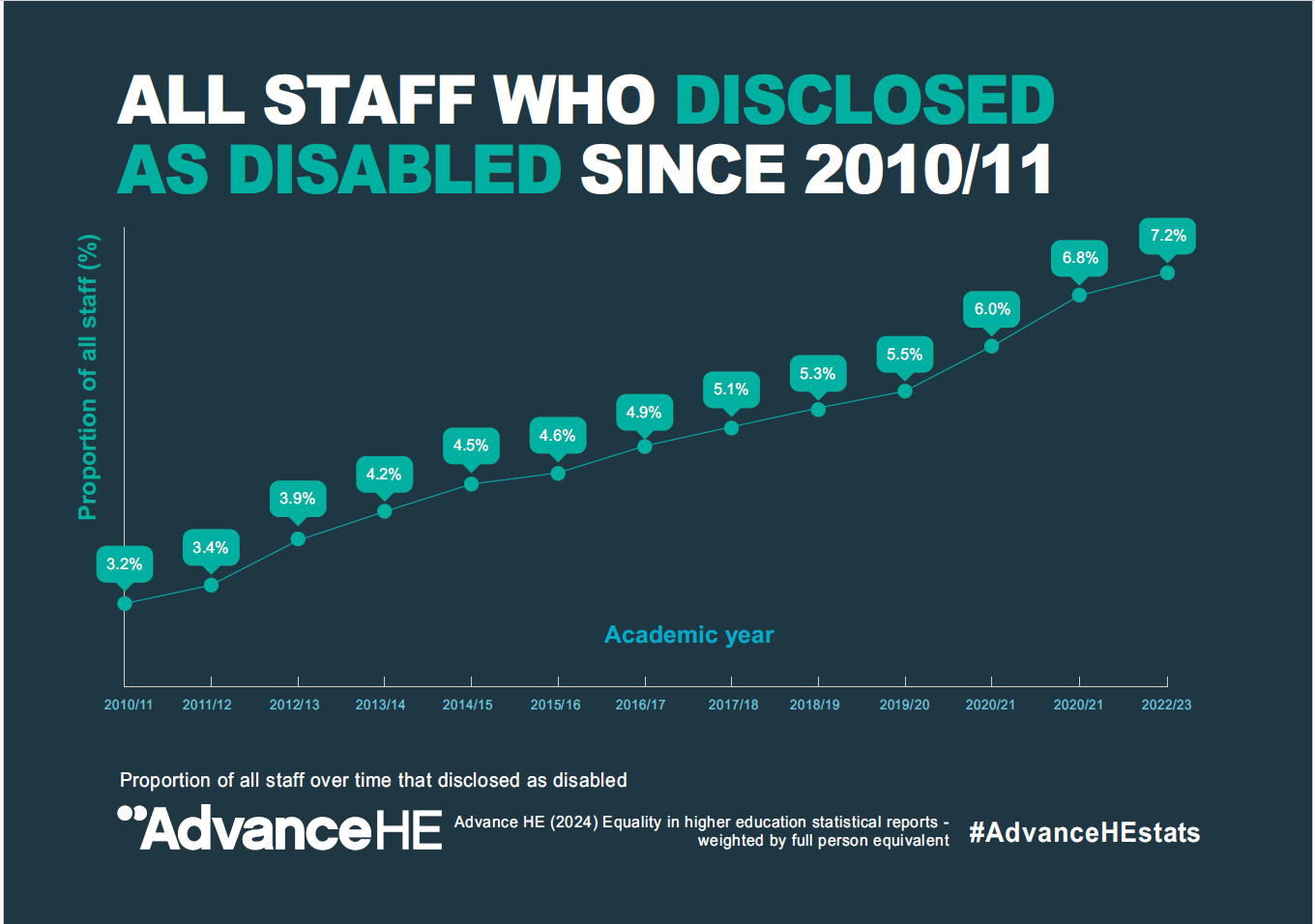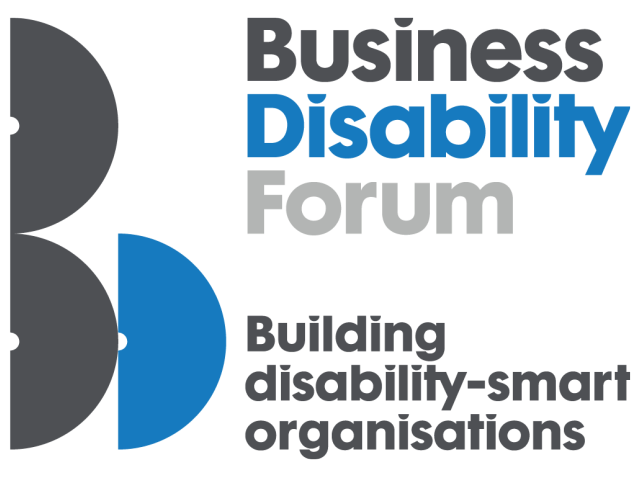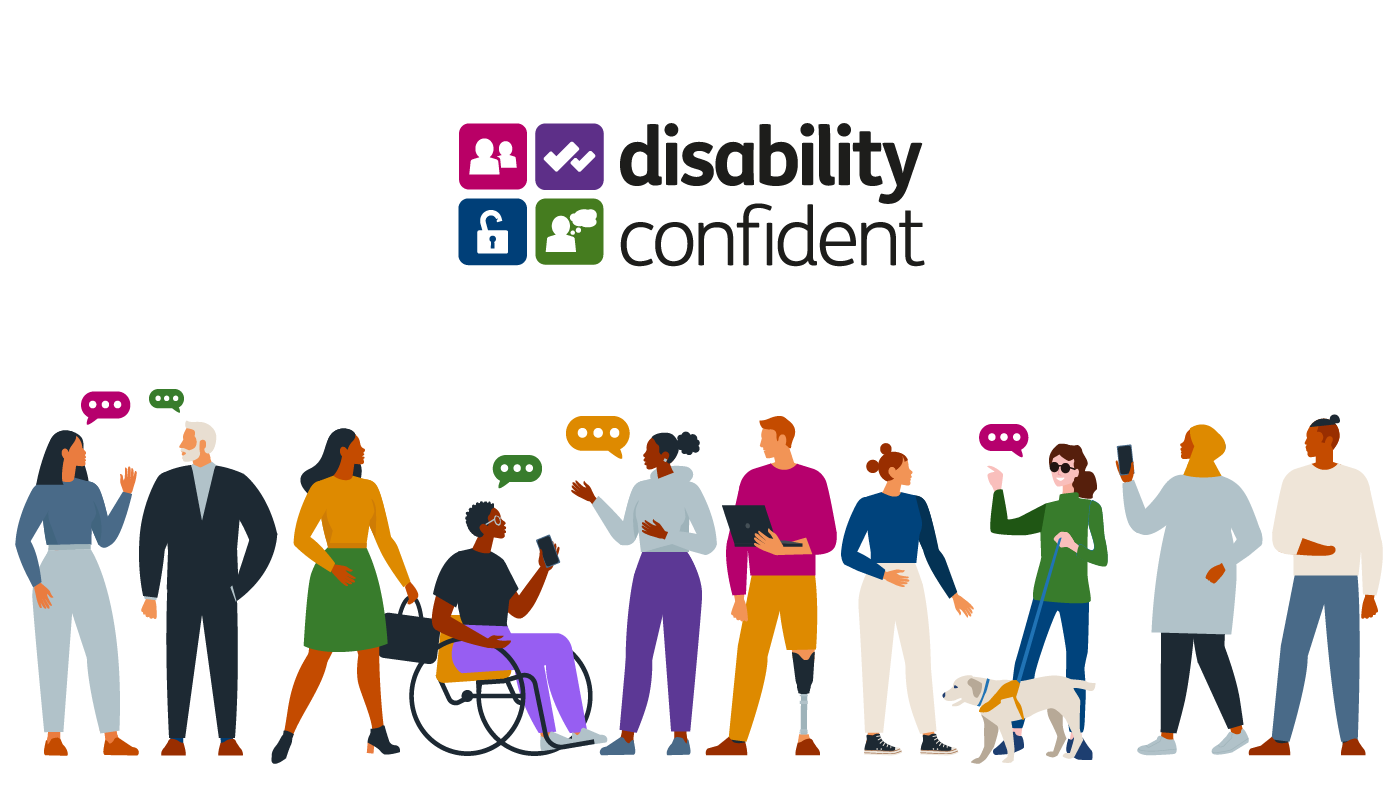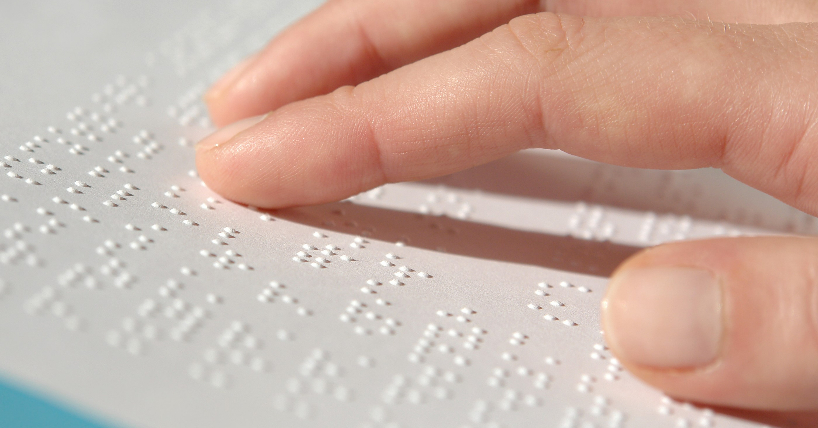Disability
A person has a disability if they have a physical or mental condition, that has a significant and long-term effect on their ability to carry out normal day-to-day activities.
Let’s talk about disability
The Equality Act
Disability is one of nine protected characteristics under the Equality Act. The Equality Act 2010 defines a disability as a physical or mental impairment that has a substantial, long-term adverse effect on your ability to carry out normal day-to-day activities. A long-term effect means something that has affected an individual or is likely to affect them for at least 12 months.
The Equality Act makes it illegal to discriminate against someone because of a disability, or if someone thinks you have a disability. Equality is ensuring that reasonable adjustments are made by employers to support people with disabilities in the workplace.
Types of disability
There are various disabilities that an individual may have and there are different categories of disabilities, including: some neurodiversities, mental health conditions and physical health conditions. Disability status can change throughout a person’s lifetime – they can be congenital or acquired. A disability can be visible or hidden. The experiences of individuals with a disability can also differ greatly. It is important to acknowledge that not all individuals who identify as neurodiverse see themselves as having a disability.
Some examples are listed below to help you understand what is classed as a disability:
- Neurodiversities – E.g. Autism, dyslexia, ADHD, dyspraxia
- Mental health conditions – E.g. Depression, anxiety, bipolar disorder, Schizophrenia
- Physical health conditions – E.g. Chronic fatigue syndrome, Irritable Bowel Syndrome, Cerebral Palsy, Muscular Dystrophy, and sensory conditions such as D/deaf and sight loss/vision impairment
Talking about disabilities
There are a range of differing opinions on the correct terminology when discussing disabilities, especially when referring to mental health. But it is generally good practice to say “person with” or “people with”. For example, “a person with a mental health condition” rather than “mentally ill person”.
You should avoid using negative language to talk about a disability and avoid labelling someone with their disability. Avoid terms that suggest normalcy when referring to someone without a disability. Instead of using the term ‘normal’ or ‘healthy’ you should say ‘non-disabled’. Rather than saying ‘disabled toilet’ you would call this an ‘accessible toilet’.
Below is a table that provides some examples on phrases and words to avoid, and suggest some more inclusive alternatives. You can also find further inclusive language guidance online.
|
Not Inclusive - phrases and terms to avoid |
Inclusive - use these terms instead |
|
The disabled, the handicapped |
Person with a disability |
|
Able-bodied person, healthy person, normal person |
Person without a disability |
|
Wheelchair-bound, handicapped, crippled, the disabled |
Person who uses a wheelchair |
|
Disabled toilets/lift |
Accessible toilets/lifts |
Disability and discrimination
Please note: Individuals with a substance addiction can still be supported under this protected characteristic if this addiction is due to medical process (e.g., addiction to painkillers after medical procedure). The act would also support people where their underlying diagnosis is mental health related (e.g., anxiety or depression).
What are reasonable adjustments?
An employer is under a duty of care to make ‘reasonable adjustments’ to premises or working practices to help disabled employees who are placed at a substantial disadvantage because of their disabilities. Failure to comply is a form of discrimination.
The employer pays for the adjustments. Many of the adjustments that can be made are not expensive. It is advised that an employer discusses the adjustments with the individual, otherwise any adjustments made may not be effective. Communication is key. You can watch the videos in the carousel at the end of this page for some examples of workplace adjustments.
How can you support colleagues with accessing reasonable adjustments?
Leaders can help support their colleagues or students in accessing reasonable adjustments at their institution. When talking to colleagues or students, think about the language you are using. Be honest if you are unsure but reassure colleagues or students that you will help them find the information. It is OK to say, "I'm not actually sure what the university offers so let me have a look." Reasonable adjustments are discussed on a case-by-case basis and must be ‘reasonably practicable’.
Leaders can also advocate for changes in their teams, faculties and institutions for change that will benefit individuals. For example, you could advocate for all lecture halls and lectures to be accessible, irrespective of whether or not you're a wheelchair user, blind, or deaf.
To find out how you can create accessible content and support colleagues who may require accessibility adjustments you can check out the Accessibility Guide in this toolkit.
Disability in academia and research
Disability disclosure and pay gaps in higher education
Advance HE report that the proportion of staff in academia who disclosed having a disability in the UK has increased over time. In 2010/11, 3.2% of staff reported having a disability. In 2020/21, this increased to 6.0%.
Advance HE also report a 9.5% pay gap between disabled and non-disabled staff in their report for the 2020-21 academic year. They reported average pay for disabled academic staff in the UK as £47,351, compared to £50,614 for non-disabled. Disability disclosure rates remain persistently lower among academic staff than professional and support staff, as well as among professors compared with other academics.
Advance HE also reported that in 2020-21 a lower proportion of professors disclosed as disabled (3.6%) than non-professorial academic staff (5.2%). There needs to be more representation and more role models to help break the stigmas and stereotypes around disability disclosure. Role models can inspire the next generation of researchers who could see themselves flourishing in academia with their disabilities. However, unconscious bias may be affecting the promotion and career progression of academics with disabilities.


Supporting colleagues who disclose a disability
To get the right level of support, it is good to disclose if you have a disability, but some people don’t disclose their disability out of fear of discrimination. A career in academia is associated with short-term contracts, long working hours and taking minimal holidays and sick leave. Some people may fear discrimination because of disclosing their disability, as they worry employers will assume they will not be able to work to the same level as a person without a disability.
If a team member discloses their disability to you, think about how you can respond to show your support. If you’re unsure what support is available, let them know you will find out what support is available. You could also ask what sort of support they require – be led by the individual. Individuals do not have a legal duty to disclose their disability but the employer does however have a legal duty to provide reasonable adjustments in the event of a disclosure.
Mental health in academia
Mental health in academia is a concerning issue. Several studies have found high levels of mental health reporting among graduate researchers. A recent survey in 2018 (with 2279 participants from across 234 institutions and 26 countries) reported that graduate students are more than six times as likely to experience depression and anxiety as compared to the general population. Advance HE has also carried out a survey with 50,000 graduate students which found that although they were generally positive about their research experience, 86% reported marked levels of anxiety.
Support from postgraduate student supervisors is essential for dealing with mental health struggles that may become a disability. Research has also found that graduates with lower scores in questionnaires for anxiety and depression were more likely to have a positive evaluation of their relationship with their supervisors. A Wellcome Trust survey reported that just over half of researchers (53%) have sought, or have wanted to seek, professional help for depression or anxiety.
As well as postgraduate students, a survey of 379 academics found that almost two-thirds reported experiencing mental health issues, such as anxiety, psychological distress, depression, and burnout, at some point in their career. Nature explains that research culture lies at the core of many scientists’ mental-health issues. Creating an environment in your research teams or your department that supports talking about mental health issues such as depression and anxiety, and working on ways to improve them, can have a big and immediate impact.
Good mental health practices
The type of support needed most likely differs across different career stages. A recent project captured some of the key stressors that may add additional strain throughout the academic journey, which could ultimately lead to mental health concerns. A range of posters, which are tailored for individuals at different stages of their academic career, are freely available and can be downloaded for use in your department.
A variety of factors can contribute positively to mental wellbeing. In academia and research these include:
- Fostering an environment where open discourse around mental health and wellbeing at work can occur without fear of repercussions.
- Making sure colleagues and students are aware of the institutional support available to them to support their mental health.
- University investment in mentoring and supervisory relationships with appropriate training for supervisors, clarification of the supervisory role, and ensuring a good fit between doctoral researcher and supervisor.
Mind have compiled a list of tips on how to improve mental wellbeing. Sometimes the recommendations you read might seem obvious, but it’s surprising how easy it is not to follow them. Sometimes a reminder of ways that someone can improve their wellbeing can motivate colleagues and students to practice looking after their mental wellbeing. Mind also have an A-Z of mental health.
Collecting data around disability
Collecting research data on disability
Billie Moffat-Knox from the School of Psychology has collated some information around inclusive language and appropriate response options for collecting data about participants’ gender, sexual orientation, sex (if relevant), ethnicity and disability/neurodiversity/health conditions. Collecting and reporting this data improves the representation of individuals within scientific research.
Below are some examples of how to ask participants if they have a disability.
Is your ability to do normal day-to-day activities substantially affected by any long term mental health conditions (e.g. depression, anxiety), physical health conditions (e.g. chronic fatigue syndrome, multiple sclerosis), and neurodiversities (e.g. autism, dyslexia, ADHD)? (This can include if activities would be affected in the absence of any treatment or aid you access or use, except glasses/contact lenses.*)
- Yes – one such factor
- Please describe, or leave blank if you would prefer not to say: [open text-entry box]
- Yes – two or more factors
- Please describe, or leave blank if you would prefer not to say: [open text-entry box]
- No
- Prefer not to say
*The language suggested here should facilitate representation of the majority of participants, but it is usually necessary to draw the line somewhere with the definition of disability employed. For example, conditions that do not currently affect the participant but are likely to recur are not specifically included with the present wording, but researchers may choose to adapt the language accordingly or add additional questions. More information regarding definitions is available at the Gov website.
What actions can you take?
What actions can we all take as researchers, research enablers or leaders in research?
- Be aware of ‘invisible disabilities’. Not all disabilities have observable characteristics, but this does not mean that the individual requires less support or adjustment.
- Don’t make assumptions about a person’s capabilities if they declare a disability. Everybody’s needs and capabilities are different, and every situation is unique.
- Encourage a healthy work/life balance. Don’t glamourise overworking culture. It’s healthier to take regular breaks to recharge and produce good-quality work.
- Be empathetic and non-judgemental when discussing any disabilities. Provide reassurance where possible to ensure colleagues and students feel safe when having discussions.
- Arrange inclusive meetings both online and offline. When you are arranging meetings with colleagues or visitors, think about how accessible they are for those invited. For example, you can record meetings on Zoom, and add live captions for those who are hard of hearing. Some people who have neurodiverse conditions may have sensory requirements (for example, no strong smells or loud noises) so keep that in mind when arranging in person meetings.
What additional actions can you take as a leader in research?
- Build trust with your team members. Arrange one-to-one meetings with team members to build rapport and a trusted relationship where they will feel comfortable to talk about their wellbeing. Check in with your team and colleagues on a regular basis. Don’t share anyone’s conditions with others unless this has been agreed upon.
- Normalise conversations around mental wellbeing. Ask your team how they are, and break down the stigmas. Stress, anxiety, fatigue and low mood affect us all. Let colleagues know that mental wellbeing is important and that you are available if they want to have a chat. You may want to put up posters about mental health, or perhaps share your own challenges if you feel able to do so. The Business Disability Forum have written about having sensitive conversations around mental health.
- Find out what adjustments can be made to support colleagues. Line Managers can help support colleagues receive adjustment measures. Colleagues may not know that this support is available to them. Where appropriate, let your teams know that workplace adjustments are available to them.
Learn more and explore

Throughout this page we have linked to articles, studies and books which you can explore to increase your understanding of disability and disability discrimination. You may also wish to check out our page about Allyship to help understand the various ways that we can be an ally to support our colleagues and students.
We recognise that not everyone has the same learning styles, so to complement some of the written information and resources listed throughout this section, below there are a range of video and book recommendations to engage with, as well some further research articles that may interest you. It is important to take the time to do self-directed learning.
The Newcastle University Library site also hosts a guide to highlight useful information around disability equality. You can also check out our EDI Toolkit Reading List on the library’s EDI page for a summary of books to engage with around the protected characteristics.
Short Articles & Blogs
- Inclusivity for All: How to make your Research Group Accessible
- Disability on campus: the challenges faced and change needed
- Toolkit for supporting disabled staff: guidance on making reasonable adjustments
- The mental health of PhD researchers demands urgent attention
- Mental Health in Academia: The Role of Workplace Relationships
- Survey highlights the challenges disabled academics face—and what can be done to address them
- How to support disabled staff to thrive
Reports
- Disability and academic careers – Kate Sang
- Postgraduate Researchers are positive about their experience, despite high anxiety
- Mental Health in Academia: A question of support
- The experiences of disabled students in higher education
- How do you respond to someone saying they have a disability?
- Without accessible conferences, we lose the voices of disabled academics – Kate Sang
Research Studies
- Ableism in academia: where are the disabled and ill academics? – Brown & Leigh, 2018
- Academic pipeline for scientists with disabilities – Booksh & Madsen, 2018
- Evidence for a mental health crisis in graduate education – Evans et al, 2018
- It Is Time to Address Ableism in Academia: A Systematic Review of the Experiences and Impact of Ableism among Faculty and Staff – Lindsay and Fuentes, 2022
Books
- Ableism in Academia – Nicole Brown
- Lived Experiences of Ableism in Academia: Strategies for Inclusion in Higher Education – Nicole Brown
- Managing your Mental Health during your PhD: A Survival Guide – Zoe J. Ayres
- Academic Ableism: Disability and Higher Education - Corporealities: Discourses Of Disability – Jay T. Dolmage
Podcast
Videos
- Hidden Disabilities
- How to be a Better Disability Ally with Daphne Frias
- The Loud Couch - Academic Ableism
- Workplace adjustments explainer- voice over animation
- Stop the Stigma: Why it's important to talk about Mental Health
- Bringing Visibility to Invisible Disabilities
- What is discrimination arising from disability?
For Newcastle colleagues and students
Below you will find a list of services and resources available to colleagues and students at Newcastle University. You may find it useful to be aware of these either for yourself or to direct members of your team to.
The Disability Interest Group
The Disability Interest Group (DIG) is a network for anyone who wants to help promote a positive, safe and respectful environment for disabled students, colleagues and visitors. They aim to promote positive attitudes towards disability and encourage good practice within the University. It is a joint network, open to all disabled and non-disabled colleagues and students at Newcastle University. For more information you can email the group.
Business Disability Forum
The University is a member of the Business Disability Forum, which is a national network promoting good practice in all areas of disability inclusion. The University can access member resources, including a range of toolkits with guidance to support individuals with a disability. If you want to know how to support a member(s) of your team, check out the pages available to see what is relevant to individual circumstances.
Colleague Health and Wellbeing Service
On the Wellbeing Hub you can find information on a range of health and wellbeing related topics which can ultimately help you, your colleagues, or your family stay healthy. Colleagues can sign up to join the mailing list to receive updates each month on new events and initiatives being hosted by the team. You can also find information about the Employee Assistance Programme (EAP).
Newcastle University’s Disability Support
The University offers support services for both colleagues and student wellbeing. You can check out the Student Wellbeing Disability Support page. The University’s Disability Equity page has information on how to let the University know if you have a condition, guidance around workplace adjustments and further resources to engage with.
Supportive Practice Tool
The Supportive Practice Tool is an at-a-glance resource that aims to offer recommendations for disability inclusion in an accessible format. The tool manages this by providing education on some of the most common features experienced by students and offering evidence-based recommendations to support inclusive practice. It was created by Kevin Johnson who undertook a two-year research project to create the resource, including a literature review, student survey, and colleague interviews.
Mental Health and Wellbeing
The University offers mental health and wellbeing support which is available to all students.
Be Well@NCL
Be well@NCL is a collection of tried and tested books, chosen in partnership with the University's Student Health and Wellbeing Service and other health professionals. They are available to be borrowed by anyone in the University to help understand and manage their mental health and wellbeing.
Training Courses and Workshops
You can access training on the Learning Management System (LMS) that covers the topic of Disability and Reasonable Adjustments (ncl login required). There is also a two-day Mental Health First Aid course available to colleagues.
Newcastle University Annual EDI Report
Within Newcastle’s ‘Annual EDI Report’, the University reports on the colleague demographic in terms of the nine protected characteristics, including disability.
Accessibility
Accessibility Guide
In order to find out how you can be accessible with your teams, create accessible content and support colleagues who may require accessibility adjustments you can check out the Accessibility Guide of this toolkit.


